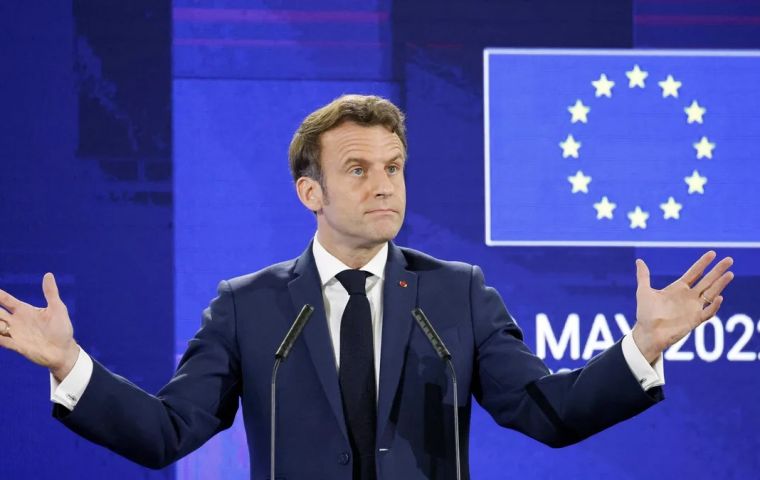MercoPress. South Atlantic News Agency
Macron proposes new political union for Europe which would include Ukraine and the United Kingdom
 Ukraine is hoping to be officially granted EU candidate status at a EC summit in June, but the French leader appeared to dash Kyiv’s highest hopes.
Ukraine is hoping to be officially granted EU candidate status at a EC summit in June, but the French leader appeared to dash Kyiv’s highest hopes. Speaking before the European Parliament in Strasbourg and later in Berlin, French president Emmanuel Macron proposed a new “European political community,” which would include both members and non-members of the EU, and thus incorporating Ukraine and even possibly the United Kingdom.
The Monday event served as both a celebration of Europe Day, which marks the anniversary of the Schuman Declaration, and the closing ceremony for the Conference on the Future of Europe, a yearlong EU self-assessment process that included a series of town hall meetings with citizens.
However Macron, who was inaugurated for his second term on Saturday, offered virtually no specifics about the proposal. The French leader appeared to be animated by a desire to find a solution for war-torn Ukraine, which has pleaded desperately for fast-track membership of the EU in the months since Russia’s brutal invasion.
Macron said the “legitimate aspiration” of the people of Ukraine, “like those of Moldova and Georgia, to join the European Union, invites us to rethink our geography and the organization of our continent”.
“Ukraine, through its combat and its courage, is already today a member of the heart of our Europe, of our family, of our union,” he declared.
Ukraine is hoping to be officially granted EU candidate status at a European Council summit in June, but the French leader simultaneously appeared to dash Kyiv’s highest hopes.
“Even if tomorrow we granted them the status of candidate for membership of our European Union … we all know perfectly well that the process allowing them to join would take several years — in truth, probably several decades. And it is the truth to say this, unless we decide to lower the standards of this membership and therefore to completely rethink the unity of our Europe.”
However, in proposing new tiers of political affiliation with EU, Macron was calling into question some of the most treasured pillars of the Union, including a balance of rights and responsibilities that entails submission to EU law and payments into a common budget.
“This new European organization would allow democratic European nations adhering to our set of values to find a new space for political cooperation, security, cooperation in energy, transport, investment, infrastructure, and the movement of people, especially our youth,” Macron said. “Joining it would not prejudge future membership in the European Union, necessarily, just as it would not be closed to those who have left.”
Macron did not explain how any of the privileges of membership would be balanced against obligations. Nor did he have any specifics on how core EU members would provide security for newer affiliates that might be vulnerable to attack, let alone for Ukraine which is already at war.
Macron was not the first to come up with a plan for strengthening the EU’s ties to partner countries, including Ukraine, before granting formal membership. Last month, Enrico Letta, a former Italian prime minister and leader of Italy’s Democratic Party, proposed a “European confederation” with aspiring member countries, that would begin with a shared “economic area,” gradually adding commitments and eventually including a common defense clause.
Macron later pushed his new plan on a visit to Berlin for talks with German Chancellor Olaf Scholz — his first foreign trip since his reelection.
He sought to talk up the advantages of his proposal, saying that it “will take several years, decades” for Ukraine to join the EU via the regular enlargement procedure. “Is that what we want? We take the risk that they will despair, that they will give up. Because there is this geographical proximity, they hold on to the same basic values, I would like to emphasize that once again, because Ukraine today is fighting for exactly that and taking all the risks for exactly that … we need to build a new political form, and not just a legal form.”
Scholz appeared to give Macron’s idea a polite but noncommittal welcome. He described it as “a very interesting proposal to deal with the big challenge that we are facing.” He said it was “absolutely necessary to find ways” for more countries to align closely with the EU. “That’s why I’m very glad about the proposal that we will discuss here now,” he said.
However there is also the financial side for new members, particularly when three quarters of the EU budget is absorbed y the Common Agriculture Policy, CAP, and its country political lobbies, which in the event of Ukraine would have to face one of the most efficient farm countries in the world.




Top Comments
Disclaimer & comment rulesCommenting for this story is now closed.
If you have a Facebook account, become a fan and comment on our Facebook Page!